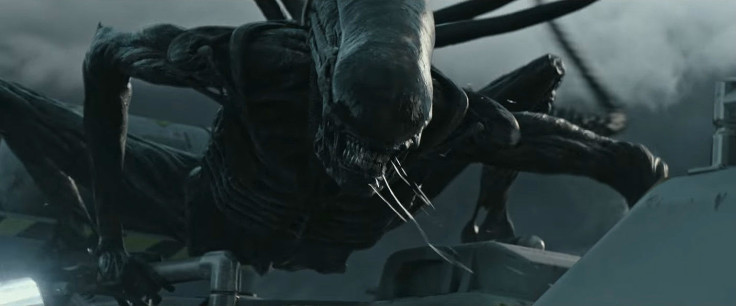Alien: Covenant review - Ridley Scott's bloodiest instalment yet lacks a much-needed sense of dread
Michael Fassbender, Katherine Waterston, Billy Crudup and Danny McBride star.

Much like he did for Alien back in 1979, filmmaker Ridley Scott allies himself with a star-studded cast to revisit the beloved sci-fi horror franchise. Is Alien: Covenant a faithful return to what fans loved about the original however, or is it in its own creation altogether?
When Prometheus came out in 2012, it divided Alien fans. For as much as Ridley Scott pretended that it was disconnected to the 'Adventures of Ripley and the Xenomorphs,' cinema-goers knew better and expected the inevitable nods and references. While the movie did have its fair share of those, the prequel felt like a different beast altogether tonally, presenting a mythology and religion-based sci-fi that concentrated more on answering questions about human creation than it did on human survival.
During the promotion for Alien: Covenant, those involved in the film were quick to argue that Scott listened to the criticism fans had of Prometheus and actively tried to create a film that would hark back more to his 1979 original here. What he ends up making however, is a strange – and not consistently coherent – mix of both Alien and Prometheus as action horror exists awkwardly amongst themes of existentialism and philosophy.
Alien: Covenant centres on the coupled-up crew of a colony spacecraft, who are prematurely awakened from hypersleep after their ship is severely damaged. When tragedy suddenly strikes, Oram (Billy Crudup) is forced to step up as captain, much to the dismay of his colleagues, who aren't entirely at ease with his dependence on faith.
In a desperate attempt to prove his leadership skills and keep the 2,000 colonists on board safe, he encourages the team to investigate a rogue transmission sent from a nearby uncharted planet; which appears to be the perfect safe haven for them all to start a new life. However, soon after they arrive, they discover the land is occupied by some pretty grisly-looking extraterrestrials as well as android David, who was last seen surviving the Prometheus mission alongside Noomi Rapace's Elizabeth Shaw.

Almost all of the action takes place once the crew make it to the mysterious planet and if you're more into blood-and-guts than loaded language, you'll likely think the film takes an age getting the characters there. On the flip side, if Alien is your favourite outing in the ongoing franchise, you'll be glad of the fleeting moments of human interaction as once Oram and the gang leave the Covenant, character development is well and truly a thing of the past. Audiences are let in on tensions between the crew – "When we get to where we're going, they won't be your crew anymore. They'll be your neighbours. Remember that" – which set up promisingly compelling sub-plots. (It's just a shame they're forgotten about once the blood starts being split).
There's one character who does get awarded an interesting arc however. Without giving too much away, Fassbender's part in proceedings is significantly increased here (and it's not just because he appears in dual roles). He's once again impressive as the not-so-morally ambiguous David and channels more robotic synthetic Walter effectively, but with John Logan and Dante Harper's bombastic script occasionally bordering on the ridiculous, it makes it difficult for Fassbender to ground either one of them.
For that very reason, it seems that Scott's decision to hone in on one of the only non-human figures in the film is baffling. He's ominous and fascinating, that's for sure, but with clouded motivations and lack of emotion, he's an all-too-questionable focal point.
Getting behind the 'heroes' is essential in a film like Alien: Covenant, as its that desire to see them live out another day that makes the scenes where their lives are on the line so thrilling. When you're not allowed to, a film like this can never soar so despite its taglines were 'run, hide and pray,' there's a serious lack of dread throughout. Xenomorph pops out, someone dies instantly, repeat; it all happens so fast, you barely sense the fear.
Aside from Fassbender (who Scott was evidently so impressed with in Prometheus, he wanted a double dose of him here for no justifiable reason other than to include a predictable plot twist), only Katherine Waterston and Billy Crudup – who plays Oram – are given any semblance of a role to sink their teeth into.

Waterston's character, mistakenly sold as the film's lead, has the most depth (somewhat) and the actor sells her grief and concern towards the beginning of the film well. But as she's forced to become more of an action hero, things just don't seem to click. That being said, Daniels never really feels like Sigourney Weaver's Ripley and that's got to be an achievement given the film's similar narratives and tropes.
Despite all that, Alien: Covenant does have its moments. As opposed to Marc Streitenfeld's almost optimisic-sounding Prometheus score that accompanied the fictional pioneer mission, composer Jed Kurzel creates terror with his tunes as he relentlessly teasing the crew's doomed fate. Haunting and much more subtle than Streitenfeld's, each musical note creeps up on you – as characters are conversing or laughing and joking – never letting you forget that this is not going to end well for those on board the Covenant.
His score particularly excels when the score incorporates moments of Streitenfeld's former work, eerily combining the two on occasion to create something particularly unsettling. There are even brief interludes where if it were only your ears that were paying attention, you could be fooled into thinking you're watching a slasher movie.
With that, it won't seem so odd to hear that Alien: Covenant is perhaps the strangest instalment in the series. There's fun to be had in it's more exhilarating set-pieces but just as it hits its stride with such scenes, it trips over itself; getting too carried away in its attempt to be grandiose. Confusedly following on from plot points set up in Prometheus and amongst the frantic chaos on screen, it also manages to answer questions such as: 'How did the titular aliens come to be?' But once the xenomorph's out of the chest so to speak, there's no putting it back in and it's safe to say, the most exciting parts of the franchise have always been those hidden in the shadows.
© Copyright IBTimes 2024. All rights reserved.






